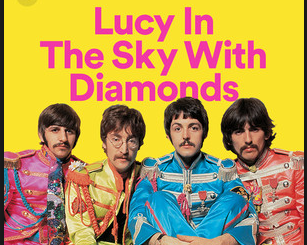Maggie Mae by The Beatles Lyrics Meaning – Unraveling Liverpool’s Lament in a Timeless Tune
Lyrics
And she never walk down Lime Street any more
Oh the judge he guilty found her
For robbing a homeward bounder
That dirty no good robbin’ Maggie Mae
To the port of Liverpool
They returned me to
Two pounds ten a week, that was my pay
The Lennon-McCartney machine graced the airwaves with countless gems, but tucked away in the labyrinth of their discography lies ‘Maggie Mae’, a hidden yet starkly vivid narrative. Orbiting the tale of a Liverpool streetwalker, The Beatles’ rendition of this traditional ditty presents a caustic yet affectionate snapshot of the city’s underbelly.
Encased in the jaunty yet simple refrain of ‘Maggie Mae’, it’s easy to gloss over the complexities that lie beneath. Merseybeat’s finest didn’t just craft a tune; they embedded a fragment of social commentary into their music. Exploring this song’s essence uncovers more than just Liverpool’s locale; it is a portal to the zeitgeist of an era.
The Flamboyant Skirts of Lime Street
Perhaps the most evocative name-drop in the song, Lime Street, holds the key to unlocking its meaning. As the beating heart of Liverpool and a synonym for rip-roaring nightlife, the street’s mention encapsulates both an era and an attitude. Lime Street was notorious for its transient population of sailors and the women who sought their patronage.
Through this lens, ‘Maggie Mae’ isn’t just a story about a single woman; it’s a requiem for the lost souls who drifted through Liverpool’s streets. The Beatles, in their straightforward language and jaunty tune, chronicled the plight of those who found themselves ensnared in the frolics of Lime Street, now forever immemorial.
The Downfall of an Infamous Siren
Maggie Mae’s tale is a tragic one, of descent from a defiant street charm to a convicted criminal. The lyrics dance around her misdemeanors, highlighting the very crime—robbery—that leads to her fall from grace. In her conviction, we find the denouement of numerous untold stories.
There’s a deeper resonance to the archetype of a thieving enchantress; she is the bold yet doomed figure, challenging the societal norms. By captivating sailors only to rob them, she symbolizes rebellion against an oppressive structure—in this instance, her sentence becoming a twisted form of poetic justice.
A Gritty Homage to Seafaring Strife
The ‘homeward bounder’ is as much a staple of Liverpool’s folklore as Maggie Mae herself. These sailors, returning with pockets vulnerable to the temptations of home, represent a class wrought with hardships. It’s a narrative focused on the unseen strain of those who toiled at sea, easy prey for someone like Maggie Mae.
The Beatles recognized the entangled fates of sailors and women like Maggie Mae, both casualties of a demanding port life. Through the song, they underscore an economic system that thrives on both the sailors’ labor and the commodification of the Maggies of the streets.
Uncovering the Veiled Message
Beneath the surface of ‘Maggie Mae’s’ catchy chorus and perceived simplicity, The Beatles slyly deliver a social critique. The song can be seen as a protest against the economic disparagement that fostered environments like Lime Street—where only the unforgiving avenues of theft and sex work seemed viable.
The Beatles, ever the documentarians of their time, turned what might seem like a folksy tune into a spotlight that challenged the subjugation of the Maggies and sailors alike. Their lyrical depiction of ‘two pounds ten a week’ as a meager wage cements the narrative in the real struggle for survival.
Lines That Echo Through Music History
‘Oh dirty Maggie Mae they have taken her away’—the opening line, delivered with an almost cheerful fatalism, sticks in the mind as a beacon of storytelling efficiency. This line, so unassuming, captures the essence of Maggie Mae’s tale, and what’s more, the entire song.
In its repetition, it becomes anthemic, trodding a fine line between condemnation and sympathy. ‘That dirty no good robbin’ Maggie Mae’ is seared into collective memory, not just because of its melodic hook, but due to its intricate waltz with the human condition, making clear that while Maggie Mae’s story was confined to a song, its implications resonate far beyond.








